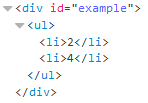这篇文章给大家分享的是有关Vue如何实现数组更新及过滤排序功能的内容。小编觉得挺实用的,因此分享给大家做个参考,一起跟随小编过来看看吧。
变异方法
Vue 包含一组观察数组的变异方法,它们将会触发视图更新,包含以下方法
push() 接收任意数量的参数,把它们逐个添加到数组末尾,并返回修改后数组的长度
pop() 从数组末尾移除最后一项,减少数组的length值,然后返回移除的项
shift() 移除数组中的第一个项并返回该项,同时数组的长度减1
unshift() 在数组前端添加任意个项并返回新数组长度
splice() 删除原数组的一部分成员,并可以在被删除的位置添加入新的数组成员
sort() 调用每个数组项的toString()方法,然后比较得到的字符串排序,返回经过排序之后的数组
reverse() 用于反转数组的顺序,返回经过排序之后的数组
<div id="example">
<div>
<button @click='push'>push</button>
<button @click='pop'>pop</button>
<button @click='shift'>shift</button>
<button @click='unshift'>unshift</button>
<button @click='splice'>splice</button>
<button @click='sort'>sort</button>
<button @click='reverse'>reverse</button>
</div>
<ul>
<li v-for="item in items" >
{{ item.message }}
</li>
</ul>
</div>
<script>
var example = new Vue({
el: '#example',
data: {
items: [
{message: 'Foo' },
{message: 'Bar' },
{message: 'Baz' }
],
addValue:{message:'match'}
},
methods:{
push(){
this.items.push(this.addValue)
},
pop(){
this.items.pop()
},
shift(){
this.items.shift()
},
unshift(){
this.items.unshift(this.addValue)
},
splice(){
this.items.splice(0,1)
},
sort(){
this.items.sort()
},
reverse(){
this.items.reverse()
},
}
})
</script>非变异方法
变异方法(mutation method),顾名思义,会改变被这些方法调用的原始数组。相比之下,也有非变异(non-mutating method)方法,例如: filter(), concat(), slice() 。这些不会改变原始数组,但总是返回一个新数组。当使用非变异方法时,可以用新数组替换旧数组
concat() 先创建当前数组一个副本,然后将接收到的参数添加到这个副本的末尾,最后返回新构建的数组
slice() 基于当前数组中一个或多个项创建一个新数组,接受一个或两个参数,即要返回项的起始和结束位置,最后返回新数组
map() 对数组的每一项运行给定函数,返回每次函数调用的结果组成的数组
filter() 对数组中的每一项运行给定函数,该函数会返回true的项组成的数组
<div id="example">
<div>
<button @click='concat'>concat</button>
<button @click='slice'>slice</button>
<button @click='map'>map</button>
<button @click='filter'>filter</button>
</div>
<ul>
<li v-for="item in items" >
{{ item }}
</li>
</ul>
</div><script>
var example = new Vue({
el: '#example',
data: {
items: ['Foo','Bar','Baz'],
addValue:'match'
},
methods:{
concat(){
this.items = this.items.concat(this.addValue)
},
slice(){
this.items = this.items.slice(1)
},
map(){
this.items = this.items.map(function(item,index,arr){
return index + item;
})
},
filter(){
this.items = this.items.filter(function(item,index,arr){
return (index > 0);
})
}
}
})
</script>以上操作并不会导致Vue丢弃现有DOM并重新渲染整个列表。Vue实现了一些智能启发式方法来最大化DOM元素重用,所以用一个含有相同元素的数组去替换原来的数组是非常高效的操作
无法检测
由于JS的限制, Vue 不能检测以下变动的数组:
1、利用索引直接设置一个项时,例如: vm.items[indexOfItem] = newValue
2、修改数组的长度时,例如: vm.items.length = newLength
<div id="example">
<div>
<button @click='setVal'>setVal</button>
<button @click='setLength'>setLength</button>
<button @click='pop'>pop</button>
</div>
<ul>
<li v-for="item in items" >{{ item }}</li>
</ul>
<p>{{ message }}</p>
</div><script>
var watchFunc = function(){
example.message = '数据发生变化';
setTimeout(function(){
example.message = '';
},500);
}
var example = new Vue({
el: '#example',
data: {
items: ['Foo','Bar','Baz'],
message:'',
},
watch:{
items:watchFunc
},
methods:{
pop(){
this.items.pop()
},
setVal(){
this.items[0]= 'match';
},
setLength(){
this.items.length = 2;
}
}
})
</script>以上代码中,直接设置值和长度使用watch不能检测到变化
以下两种方式都可以实现和vm.items[indexOfItem]=newValue相同的效果, 同时也将触发状态更新
// Vue.set
Vue.set(example1.items, indexOfItem, newValue)
// Array.prototype.splice
example1.items.splice(indexOfItem, 1, newValue)为了解决第二类问题,可以使用 splice
example1.items.splice(newLength)<div id="example">
<div>
<button @click='setVal1'>setVal1</button>
<button @click='setVal2'>setVal2</button>
<button @click='setLength'>setLength</button>
</div>
<ul>
<li v-for="item in items" >{{ item }}</li>
</ul>
<p>{{ message }}</p>
</div><script>
var watchFunc = function(){
example.message = '数据发生变化';
setTimeout(function(){
example.message = '';
},500);
}
var example = new Vue({
el: '#example',
data: {
items: ['Foo','Bar','Baz'],
message:'',
},
watch:{
items:watchFunc
},
methods:{
setVal1(){
Vue.set(this.items, 0, 'match')
},
setVal2(){
this.items.splice(1, 1, 'xiaohuochai')
},
setLength(){
this.items.splice(2)
}
}
})
</script>过滤排序
有时,要显示一个数组的过滤或排序副本,而不实际改变或重置原始数据。在这种情况下,可以创建返回过滤或排序数组的计算属性
【computed】
<div id="example">
<ul>
<li v-for="n in evenNumbers">{{ n }}</li>
</ul>
</div><script>
var example = new Vue({
el: '#example',
data: {
numbers: [ 1, 2, 3, 4, 5 ],
},
computed: {
evenNumbers: function () {
return this.numbers.filter(function (number) {
return number % 2 === 0
})
}
}
})
</script>【methods】
在计算属性不适用的情况下 (例如,在嵌套 v-for 循环中) 可以使用一个 method 方法
<div id="example">
<ul>
<li v-for="n in even(numbers)">{{ n }}</li>
</ul>
</div><script>
var example = new Vue({
el: '#example',
data: {
numbers: [ 1, 2, 3, 4, 5 ],
},
methods: {
even: function (numbers) {
return numbers.filter(function (number) {
return number % 2 === 0
})
}
}
})
</script>
感谢各位的阅读!关于“Vue如何实现数组更新及过滤排序功能”这篇文章就分享到这里了,希望以上内容可以对大家有一定的帮助,让大家可以学到更多知识,如果觉得文章不错,可以把它分享出去让更多的人看到吧!
亿速云「云服务器」,即开即用、新一代英特尔至强铂金CPU、三副本存储NVMe SSD云盘,价格低至29元/月。点击查看>>
免责声明:本站发布的内容(图片、视频和文字)以原创、转载和分享为主,文章观点不代表本网站立场,如果涉及侵权请联系站长邮箱:is@yisu.com进行举报,并提供相关证据,一经查实,将立刻删除涉嫌侵权内容。